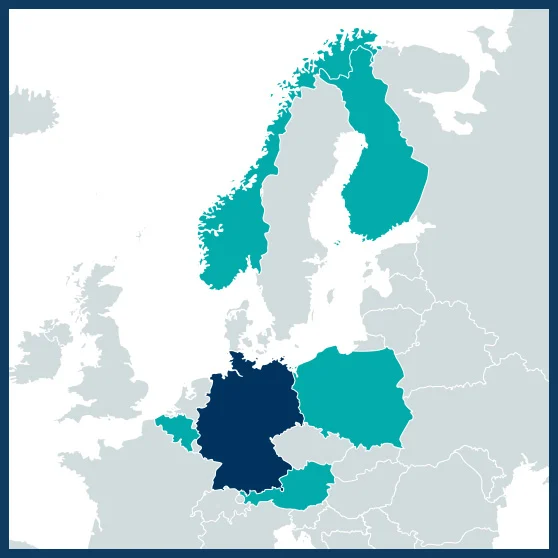01/02/2021 – 31/03/2024
€ 1,479,096
Prof. Dr. Jürgen Kreyling
juergen.kreyling@uni-greifswald.de
Coordinator: Experimental Plant Ecology– Greifswald University– Greifswald – Germany
Geography and Regional Research – University of Vienna – Vienna – Austria
Plants and Ecosystems (PLECO) – University of Antwerp – Wilrijk – Belgium
Bioeconomy and environment – Natural Resources Institute Finland (LUKE) – Helsinki
– Finland
Biogeochemistry and Soil Quality – Norwegian Institute of Bioeconomy Research – Ås – Norway
Biological and Chemical Sciences – University of Warsaw – Warszawa – Poland

Europe faces three major environmental challenges: greenhouse gas emissions, nitrogen pollution, and biodiversity loss. Peatlands play a vital role in addressing these challenges. Drained peatlands in the EU emit ~5% of total EU greenhouse gas emissions, mainly from conventional agriculture on drained peat soils. Drained peatlands in the EU are also an annual source of 1-5 Mt of nitrate, with substantial impact on water quality, drinking water provision, and biodiversity. Typical peatland biodiversity has been devastated by drainage. Consequently, all relevant EU policy objectives include rewetting of drained peatlands as a nature-based solution to avoid peatland GHG emissions, reinstall carbon sequestration, reduce nitrogen mineralization, enhance nitrogen removal, and/or restore peatland- specific biodiversity. A wide range of alternative, wet land use options is needed, which must include options that allow for a fair income to farmers.
The objective of PRINCESS is to evaluate the synergies and trade-offs between key EU policy objectives such as (1) restoring biodiversity and healthy ecosystems, (2) keeping global warming below 2°C, (3) clean water, and (4) guaranteeing a fair income to farmers at rewetted peatlands under alternative land use options. PRINCESS will explore to what extent nitrogen loads can guide decision-making with respect to land use that optimally contributes to these policy objectives. PRINCESS tests basic research hypotheses and delivers tools and guidelines for sustainable use of rewetted peatlands in Europe.
To achieve these objectives, PRINCESS:
• Focuses on the peatlands which are the largest sources of GHG and affected most by nitrogen loads, i.e. temperate fens.
•Compares wet wilderness, low-intensity paludiculture and high-intensity paludiculture.
• Brings together complementary skills from six peatland-rich countries, including those with little (FI, NO, PL) and strong peatland degradation and N loading (AT, BE, DE), the latter being also front-running in rewetting and paludicultures.
• Analyses crucial processes under highly controlled conditions in the laboratory and in mesocosms, tests them under more realistic conditions in the field, and models and upscales them to catchment and EU scale.
• Uses these different scales of study to maximise internal (sound interpretation of causal effects) and external (their relevance) validity.
• Applies the most advanced techniques and methods from biogeochemistry, microbial ecology, plant ecology, socioeconomic modeling on and across scales, using measurable and quantifiable indicators.
Dialogue with stakeholders (e.g. farmers and neighbours of peatland sites, fen peatland scientists, regional/national governments and advisory bodies, EU Commission and NGOs at European and international level) and capacity building will take place e.g. during meetings along with field campaigns, scientific events and a policy event. PRINCESS will advance the knowledge base of various stakeholder groups on fen restoration and will directly impact the application of policy in this field by providing vital scientific information for agricultural land use policies for peatlands in the EU (e.g. via publications and a webinar) and by targeted policy outreach (e.g. a policy brief on opportunities and co-benefits of rewetting at EU level and a policy event).